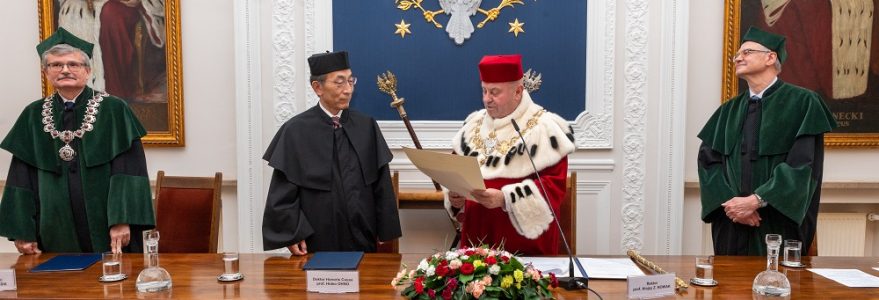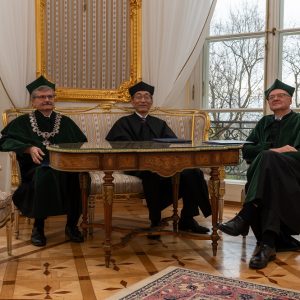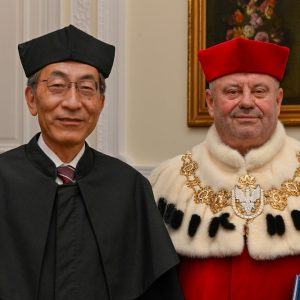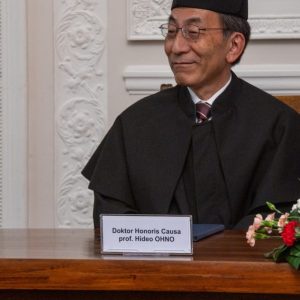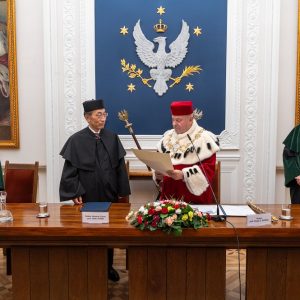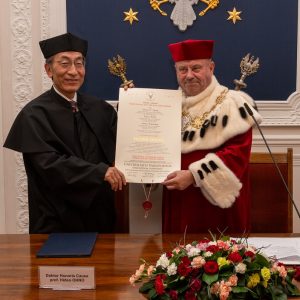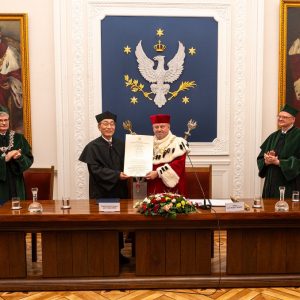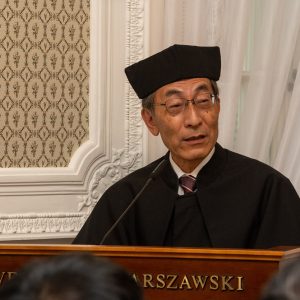Prof. Hideo Ohno, a prominent condensed matter physicist from Tohoku University, received an honorary doctorate from the University of Warsaw. The ceremony took place on 13th November in the Senate Hall of the Kazimierzowski Palace.
The University of Warsaw is honoured today to grant the title of doctor honoris causa to a world-class physicist whose research interests include semiconductor systems with embedded magnetic properties and spintronics, fields which are the key to the development of modern science: artificial intelligence or information and communication technologies,” said Prof. Alojzy Z. Nowak, Rector of the University of Warsaw, during the ceremony granting the UW honorary doctorate to Prof. Ohno “We are pleased that such a significant researcher is joining the University of Warsaw community,” he added.
Prof. Ohno received his doctoral degree from the University of Tokyo in 1982. Between 1982 and 1983, he was a lecturer at the School of Engineering at Hokkaido University. From 1983 to 1994, he was working as an associate professor at this university. He was a visiting scientist at IBM T. J. Watson Research Center from 1988 to 1990. In 1994, the physicist was appointed a professor at Tohoku University, and a professor at the Research Institute of Electrical Communication from 1995. In 2004, he became the head of the Laboratory of Nanoelectronics and Spintronics at Tohoku University. From 2010 until March 2018, Prof. Ohno served as the Director of the Center for Spintronics Integrated Systems. As of 2018, he is the President of Tohoku University.
The laudation was delivered by Prof. Andrzej Twardowski from the UW Faculty of Physics, the supervisor of the UW honorary doctorate. He presented extensive scientific achievements of the Japanese physicist. The distinguished physicist has published over 500 academic papers, including groundbreaking articles that set directions for further research. Prof Ohno’s articles have been published in scientific journals such as Science, Nature, Nature Physics, Nature Materials, and Physical Review Letters. His papers have been cited more than 104,000 times and his Hirsh index exceeds 80. Prof. Ohno is the co-author of 119 patent families (the same invention patented in different countries), including 77 US patents.
Unique research activity
Prof. Twardowski also stressed the importance of long-standing cooperation with researchers from the University of Warsaw.
In his research Prof. Ohno conducts very effective international collaboration, including also physicists from the Warsaw physicist community. I am proud to participate in this cooperation. My personal experience is very positive and pleasant. I remember numerous friendly meetings we both had in different places in the United States, Japan and Poland. I remember scientific discussions during these meetings. Prof. Ohno offered me access to unique samples produced in his laboratory. This was extremely helpful and resulted in many publications. In 1997, our University organised together with Prof. Ohno the first Polish-Japanese Symposium on Magnetic Semiconductors. In the following years these symposia were continued both in Warsaw and Japan,” Prof. Twardowski indicated.
Contemporary information technologies use semiconductors to process information and ferromagnetic materials to store it. Prof. Hideo Ohno pioneered the development of a new class of materials – ferromagnetic III-V semiconductor compounds, which combine the advantages of magnetics and semiconductors. After mastering the growth, characterisation and processing of this material system, Prof. Ohno has designed a series of structures and devices, in which groundbreaking functionalities have been demonstrated by his team, with an enormous impact on the entire field of spintronics and its large-scale applications.
Together with his team at Tohoku University and collaborations with international researchers, Prof Ohno contributed to a large number of discoveries. Three discoveries proved to be groundbreaking for condensed matter physics. The first relates to the studies, in which an electric field can be used to control the value and direction of magnetism. The second discovery is the experimental demonstration that domain-walls can be moved by an electric current without a magnetic field. The third discovery is the construction of a prototype processor containing embedded spintronic memory cells and the demonstration of their record-breaking characteristics: speed of operation and energy efficiency.
As a scientist I am extremely honoured to receive this honorary doctorate in Poland, which is the home for great scientists like Maria Skłodowska-Curie and Mikołaj Kopernik. I see this honour as both an achievement and obligation to remain devoted to contributing to the world with my knowledge and experience,” Prof. Ohno said.
For his research and scientific achievements, Prof. Ohno has been honoured with a number of prestigious awards, including the IBM Japan Science Award (1998), the IUPAP Magnetism Prize (2003), Japan Academy Prize (2005), Presidential Prize for Research Excellence, Tohoku University (2005).
The resolution to grant the title of doctor honoris causa of the University of Warsaw to Prof. Hideo Ohno was adopted on 16th June 2021 by the University of Warsaw Senate.



